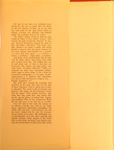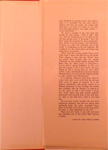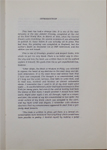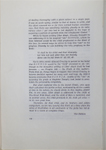|
1. |
|
Apologia
(Apology) |
|
2. |
|
De Arte
Kabbalistica (On the Qabalistic Art) |
|
3. |
|
De Vita
Corrigenda (On Correcting One’s Life) |
|
4. |
|
Legenda
de Amore (Fables of Love) |
|
5. |
|
Gesta de
Amore (Of Love in History) |
|
6. |
|
Ultima
Thesis de Amore (A Final Thesis on Love) |
|
7. |
|
De Natura
Sua Percipienda (On Perceiving One’s Own Nature) |
|
8. |
|
Altera de
Via Naturae (More on the Way of Nature) |
|
9. |
|
Quo Modo
Natura Sua Est Legenda (How One Should Consider One’s
Nature) |
|
10. |
|
De
Somniis. Causa Per Accidens. ( On Dreams. Accidental) |
|
11. |
|
De
Somniis. Causa Per Naturam.(On Dreams. Natural) |
|
12. |
|
De
Somniis. Vestimenta Horroris. (On Dreams. Clothed with
Horror) |
|
13. |
|
De
Somniis. Sequentia. (On Dreams. Continued) |
|
14. |
|
De
Somniis. Clavicula. (On Dreams. The Key) |
|
15. |
|
De Via
Per Empyraeum (On Astral Travel) |
|
16. |
|
De Cultu
(On Thelemic Cult) |
|
17. |
|
De
Clavicula Somniorum (On the Key of Dreams) |
|
18. |
|
De Somno
Lucido (On the Sleep of Light) |
|
19. |
|
De
Venenis (On Poisons) |
|
20. |
|
De Motu
Vitae (On the Motion of Life) |
|
21. |
|
De Morbis
Sanguinis (On the Diseases of the Blood) |
|
22. |
|
De Cursu
Amoris (On the Way of Love) |
|
23. |
|
De
Nuptiis Mysticis (On the Mystical Marriage) |
|
24. |
|
De
Voluptate Poenarum (On the Joy of Sorrows) |
|
25. |
|
De
Voluntate Ultima (On the Ultimate Will) |
|
26. |
|
De
Differentia Rerum (On the Difference between Things) |
|
27. |
|
De
Voluntate Tacita (On the Hidden Will) |
|
28. |
|
De
Formula Summa (On the SUpreme Formula) |
|
29. |
|
De Via
Inertiae (On the Way of Inertia) |
|
30. |
|
De Via
Libertatis (On the Way of Freedom) |
|
31. |
|
De Lege
Motus (On the Law of Motion) |
|
32. |
|
De
Legibus Contra Motum (On the Laws Against Motion) |
|
33. |
|
De
Necessitate Communi (On the Common Need) |
|
34. |
|
De
Libertate Corporis (On the Freedom of the Body) |
|
35. |
|
De
Libertate Mentis (On the Freedom of the Mind) |
|
36. |
|
De
Libertate Juvenum (On the Freedom of Children) |
|
37. |
|
De Vi Per
Disciplinam Colenda (On Cultivating Strength through
Discipline) |
|
38. |
|
De Ordine
Rerum (On the Order of Things) |
|
39. |
|
De
Fundamentis Civitatis (On the Fundamentals of the State) |
|
40. |
|
De
Voluntate Juvenum (On the Will of Children) |
|
41. |
|
De Modo
Disputandi (On How to Teach) |
|
42. |
|
De
Voluntate Juvenis Cognoscenda (On Learning How to Know the
Will of a Child) |
|
43. |
|
De Auro
Rubeo (On the Red Gold) |
|
44. |
|
De
Sapientia in re Sexuali (On Wisdom in Sexual Affairs) |
|
45. |
|
De
Gradibus Aequis Scientiae (On the Right Gain of Knowledge) |
|
46. |
|
De
Virtute Audendi (On the Virtue of Daring) |
|
47. |
|
De Arte
Mentis Colendi (On the Training of the Mind) (1) Mathematica
(Mathematics) |
|
48. |
|
Sequitur
(Continued) (2) Classica (Classics) |
|
49. |
|
Sequitur
(Continued) (3) Scientifica (Science) |
|
50. |
|
De Modo
Quo Operet Lex Magica (How Magickal Law Works) |
|
51. |
|
De
Machina Magica (On the Mechanism of Magick) |
|
52. |
|
De
Harmonis Animae Cum Corpore (On the Harmony of the Soul with
the Body) |
|
53. |
|
De
Mysterio Prudentiae (On the Mystery of Economy) |
|
54. |
|
De Arte
Alchemica (On the Alchemical Art) |
|
55. |
|
De Arcano
Subtilissimo (On the Most Subtle Secret) |
|
56. |
|
De
Menstruo Artis (On the Medium of the Art) |
|
57. |
|
De
Necessitate Voluntatis (On the Necessity of the Will) |
|
58. |
|
De
Comedia Universa, Quae Dictur Pan (On the Universal Comedy
which is called Pan) |
|
59. |
|
De
Caecitia Hominum (On the Blindness of Men) |
|
60. |
|
Allegoria
de Caissa (An Allegory on Chess) |
|
61. |
|
De
Veritate Falsi (On the Truth of Falsehood) |
|
62. |
|
De
Relatione Illusionum (On the Relations of Illusion) |
|
63. |
|
De
Prudentia (On Prudence) |
|
64. |
|
De
Ratione Magi Vitae (On the Relativity of the Life of the
Magician) |
|
65. |
|
De Corde
Candido (On the Pure Heart) |
|
66. |
|
De
Conformitate Magi (On the Conformity of the Magician) |
|
67. |
|
De Poetis
(On the Poets) |
|
68. |
|
De Magis
Ordinis A∴A∴ Quibus Caro Fir Verbum (On the Magi of the A∴A∴
in whom the Word takes Flesh) |
|
69. |
|
De Magis
Tempori Antiqui: Imprimis, de Lao-Tze (On the Magi of Old,
First, Lao-Tze) |
|
70. |
|
De
Gautama (On Gautama) |
|
71. |
|
De Sri
Krishna et de Dionyso (On Sri Krishna and Dionysus) |
|
72. |
|
De Tahuti
(On Tahuti) |
|
73. |
|
De Quodam
Mago Aegyptiorum, Quem Appelunt Judaei Mosheh (On that
Egyptian Magus whom the Jews called Mosheh) |
|
74. |
|
De Mago
Arabico Mohammed (On the Arabian Magus Mohammed) |
|
75. |
|
De se
Ipso ΤΩΙ ΜΕΤΑ
ΘΗΡΙΩΙ, ΤΩΙ ΑΟΓΩΙ ΑΙΩΝΟΣ Cujuc Verbum Est
Θελημα
(On the
Great Beast Himself, the Logos of the Aeon, whose word is
Thelema) |
|
76. |
|
Mandatum
ad Filium Suum (A Command to His Son) |
|
77. |
|
Quare
Filium Creavit: Ut Fiat Libertas (Wherefore he Begat his
Son: So that there be Freedom) |
|
78. |
|
De Sua
Debilitate (On His Frailty) |
|
79. |
|
De Manu
Quae Magum Sustinet (On the Hand that Upholds the Magus) |
|
80. |
|
De Suo
Peccato (On His Sin) |
|
81. |
|
De Sua
Victoria Per Nomen Babalon (On His Victory through the Name
Babalon) |
|
82. |
|
De Arcano
Nefando (On the Forbidden Secret) |
|
83. |
|
De Arcano,
Per Quod Spiritus Quidam in Corpore Recipiatur (On the
Secret through which any Spirit is Received in the Body) |
|
84. |
|
De Clave
Kabbalistica Hujus Artis (On the Qabalistic Key of this Art) |
|
85. |
|
De Missa
Spiritus Sancti (On the Mass of the Holy Ghost) |
|
86. |
|
De
Formula Tota (On the Complete Formula) |
|
87. |
|
De Hac
Formula Considerationes Kabbalisticae (Qabalistic
Considerations on this Formula) |
|
88. |
|
De
Quibusdam Artibus Magicis (On Certain Arts Magick) |
|
89. |
|
De Magno
Opere (On the Great Work) |
|
90. |
|
De
Gradibus ad Magnum Opus (On the Steps to the Great Work) |
|
91. |
|
De
Formula Lunae (On the Formula of the Moon) |
|
92. |
|
De
Aquilae Sumenda (On the Taking of the Eagle) |
|
93. |
|
De
Medicinis Secundum Quattuor Elementa (On the Chemical Agents
According to the Four Elements) |
|
94. |
|
De
Virtute Experimentiae in Hoc Arte (On the Virtue of
Experience in this Art) |
|
95. |
|
De
Sacramento Vero (On the True Sacrament) |
|
96. |
|
De
Discipulis Regendis (On Directing Disciples) |
|
97. |
|
De
Quibusdam Morbis Discipulorum (On Certain Diseases of
Disciples) |
|
98. |
|
De Culpis
Domi Petendis (On Watching for Faults in the House) |
|
99. |
|
De
Corpore Umbra Hominis (On the Body, that is the Shadow of
Man) |
|
100. |
|
De
Sirenis (On Sirens) |
|
101. |
|
De Femina
Quadam (On a Certain Woman) |
|
102. |
|
De Sua
Virtute (On Her Virtue) |
|
103. |
|
De
Aliquibus Modis Oraculi Petendi (On Seeking for Certain
Types of Oracle) |
|
104. |
|
De
Fratribus Nigris Filiis Iniquitatis (On the Black Brothers,
Sons of Iniquity) |
|
105. |
|
De
Virtute Chirurgica (On the Virtue of Surgery) |
|
106. |
|
De
Operibus Microcosmi. Quorum Sunt Quattuor Minores. (On the
Four Lesser Operations of the Microcosmis Star) |
|
107. |
|
De
Operibus Stellae Microcosmi. Quorum Sunt Quattuor Mahores.
(On the Four Major Operations of the Microcosmic Star) |
|
108. |
|
De Stella
Macrocosmi (On the Macrocosmic Star) |
|
109. |
|
De Sua
Femina Olun, et de Ecstasia Praeter Omnia (On His WOman Olun
and on the Ecstasy that Surpasses All) |
|
110. |
|
De Nomine
Olun (On the Name Olun) |
|
111. |
|
De Viris
Magnanimis, Amore Praeclarissimis (On Great Men, Famous in
Love) |
|
112. |
|
De
Castitate (On Chastity) |
|
113. |
|
De
Ceremonio Equinoxi (On the Ceremony of the Equinox) |
|
114. |
|
De Luce
Stellarum (On the Light of the Stars) |
|
115. |
|
De Cantu
(On Song) |
|
116. |
|
De
Stultitia Humana (On Human Stupidity) |
|
117. |
|
De Suo
Proelio (On His Struggle) |
|
118. |
|
De
Necessitate Verbi Clamandi (On the Need for Declaring the
Word) |
|
119. |
|
De
Mysterio Eucharistico Universali (On the Mystery of the
Universal Sacrament) |
|
120. |
|
De Recto
in Recto (On the Rightness of Things) |
|
121. |
|
De
Virgine Beata (On the Blessed Virgin) |
|
122. |
|
De Joca
Suae Moechae (On the Sport of His Mistress) |
|
123. |
|
De
Periculo Jocorum Amoris (On a Danger in the Sports of Love) |
|
124. |
|
De
Libidine Secreta (On the Unconscious, or Libido) |
|
125. |
|
De Ordine
Civitatum (On the Organization of Communities) |
|
126. |
|
De
Scientiae Modo (On the Method of Science) |
|
127. |
|
De
Monstris (On Monsters) |
|
128. |
|
De
Inferno Palatio Sapientiae (On the Hidden Place of Wisdom) |
|
129. |
|
De Vitiis
Voluntatis Secretae (On the Defects of the Hidden Will) |
|
130. |
|
De
Ratione Praesidio Voluntatis (On Reason, the Minister of the
Will) |
|
131. |
|
De Cursu
Sapientis (On the Way of Wisdom) |
|
132. |
|
De
Ratione Quae Sine Voluntate est fons Maniae (On Reason,
Source of Madness When not under Will) |
|
133. |
|
De
Veritate Quem Feminae non Dicere Licet (On Truth, which may
not be told to a Woman) |
|
134. |
|
De Natura
Feminae (On the Nature of Woman) |
|
135. |
|
De Duobus
Praemiis Viae (On the Two Rewards of the Path) |
|
136. |
|
De
Ecstasia Samadhi, Quo Illis Differit (On the Ecstasy of
Damadhi and How it Differs from Others) |
|
137. |
|
De Arte
Amoris et Deliciarum Mystici (On the Art of Love and the
Pleasures of the Mystic) |
|
138. |
|
De
Praemio Summo, Vera Sapientia et Beatitudine Perfects (On
the Highest Reward, True Wisdom and Perfect Happiness) |
|
139. |
|
De
Inferno Sevorum (On the Hell of the Slaves) |
|
140. |
|
Rhapsodia
de Domina Nostra (A Rhapsody to Our Lady) |
|
141. |
|
Rhapsodia
de Astro Suo (A Rhapsody to His Star) |
|
142. |
|
De
Harmonia Voluntatis Cum Destinia (On the Harmony of Will and
Fate) |
|
143. |
|
Paranthesis de Quadam Virgine (A Parenthesis on a Certain
Virgin) |
|
144. |
|
De
Constantia Amoris, Corvo Candido (On Constancy in Love, To a
White Raven) |
|
145. |
|
De
Mysterio Mali (On the Mystery of Evil) |
|
146. |
|
De
Virtute Tolerantia (On the Virtue of Tolerance) |
|
147. |
|
De
Formula Deorum Morientium (On the Formula of the Dying God) |
|
148. |
|
De
Stultis Malignis (On Malign Fools) |
|
149. |
|
Apologia
Pro Suis Literis (An Apology for His Writings) |
|
150. |
|
Laus
Legis Thelema (In Praise of the Law of Thelema) |
|
151. |
|
De
Sphinge Aegyptiorum (On the Sphinx of the Egyptians) |
|
152. |
|
De Natura
ΣΦΙΝΨ
(Of the Nature of the Sphinx) |
|
153. |
|
De Tauro
(On the Bull) |
|
154. |
|
De Leone
(On the Lion) |
|
155. |
|
Altera de
Leone (Further on the Lion) |
|
156. |
|
De Viro
(On the Man) |
|
157. |
|
De
Dracone, Quae est Aquila, Serpens, Scorpion (On the Dragon,
which is the Eagle, Serpent and Scorpion) |
|
158. |
|
De
Quattuor Virtutis
ΣΦΙΝΨ
(On the four virtues of the Sphinx) |
|
159. |
|
De Libra,
In Qua Quattuor Virtutes Aequipollent (On the Balance in
which the Four Virtues Gather Power) |
|
160. |
|
De
Pyramide (On the Pyramid) |
|
161. |
|
Prolegomena de Silentio (Concerning Silence) |
|
162. |
|
De Natura
Silentii Nostri (On the Nature of Our Silence) |
|
163. |
|
De
Formula Recta Draconis (On the Correct Formula of the
Dragon) |
|
164. |
|
De Sua
Carta Coelorum (On His Horoscope) |
|
165. |
|
De Opere
Suo (On His Work) |
|
166. |
|
De
Fratribus Nigris (On the Black Brothers) |
|
167. |
|
De Arte
Alchemistica (On the Alchemical Art) |
|
168. |
|
De
Femina: Quae est Propria Joco (On Woman, who is fit for a
Jest) |
|
169. |
|
De
Formula Feminae (On the Formula of Woman) |
|
170. |
|
Verba
Magistri Sui de Femina (His Master’s Words on Woman) |
|
171. |
|
De Via
Propria Feminis (On the Proper Conduct of Woman) |
|
172. |
|
De Hac Re
Altera Intelligenda (Further Concerning This) |
|
173. |
|
De
Clavibus Mortis et Diaboli, Arcanis Tou Tarot Fraternitatis
R. C. (On the Keys of Death and the Devil, Arcana of the
Tarot of the R. C. Brotherhood) |
|
174. |
|
Sequitur
de His Viis (Further on these Paths) |
|
175. |
|
De Oculo
Hoor (On the Eye of Hoor) |
|
176. |
|
De Sua
Initiatione (On His Initiation) |
|
177. |
|
De Herbo
Sanctissimo Arabico (On the Most Holy Grass of the Arabs) |
|
178. |
|
De
Quibusdam Mysteriis, Quae Vidi (On Certain Mysteries I have
Seen) |
|
179. |
|
De Quorum
Modo Meditationes (On a Certain Method of Meditation) |
|
180. |
|
Sequitur
de Hac Re (Further on This) |
|
181. |
|
Dequitur
de Hac Re (Further on This) |
|
182. |
|
Conclusio
de Hac Modo Sanctitatis (Conclusion on this Method of
Holiness) |
|
183. |
|
De Via
Sola Solis (On the Way of the Sun) |
|
184. |
|
De
Prudentia Ordinis A∴A∴ (On the Prudence of the A∴A∴) |
|
185. |
|
Altera de
Sua Via (Further on this Path) |
|
186. |
|
De
Prudentia Artis Docendi (On Prudence in the Art of Teaching) |
|
187. |
|
De Mente
Inimica Animo (On the Mind, Enemy of the Soul) |
|
188. |
|
De
Illuminatum Operibus Diversis (On Different Works of the
Illuminators) |
|
189. |
|
De Eadem
Re ALtera Verba (Further Words on This) |
|
190. |
|
De Pace
Perfects Luce (On the Perfect Peace with Light) |
|
191. |
|
De Pace
Perfecta (On Perfect Peace) |
|
192. |
|
De Morte
(On Death) |
|
193. |
|
De
Adeptis R. C. Escatologia (On the Eschatology of the R. C.
Adepts) |
|
194. |
|
De
Nuptiis Summis (On the Supreme Marriage) |
|
195. |
|
De Arte
Voluptate Dilemma Quaedam (On a Certain Problem in the Art
of Pleasure) |
|
196. |
|
De Hoc
Modo Dissolutio (On Unraveling of this Knot) |
|
197. |
|
De
Comedia, Quae IIan Dictur (On the Comedy which is called
Pan) |
|
198. |
|
De Ludo
Amoris (On the Game of Love) |
|
199. |
|
De Gaudio
Stupri (On the Pleasures of Debauchery) |
|
200. |
|
De
Caecitia Philosophorum Antiquorum (On the Blindness of the
Ancient Philosophers) |
|
201. |
|
De
Heresia Manichaea (On the Manichean Heresy) |
|
202. |
|
De
Veritate Rerum (On the Truth of Things) |
|
203. |
|
De
Aphorismo Ubi Dico: Omnia Sunt (On My Aphorism: All Aye) |
|
204. |
|
De
Ratione Hujus Epistolae Scribendae (On the Reason for
Writing this Letter) |
|
205. |
|
De Natura
Hujus Epistolae (On the Nature of this Letter) |
|
206. |
|
De Modo
Quo Haec Epistolam Scripsi (How I Wrote this Letter) |
|
207. |
|
De
Sapientia et Stultitia (Of Wisdom and Folly) |
|
208. |
|
De
Oraculo Summo (On the Last Oracle) |
| |
|
|
|
Illustration |
|
- |
|
Portrait of Aleister Crowley mounted on page iii as
frontispiece. |














